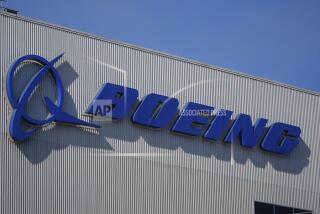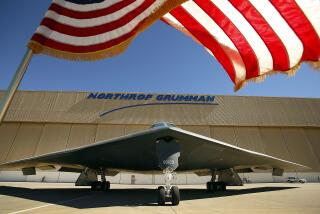4,000 Hughes Jobs to Be Cut : Defense Firm Acts to Boost Competitiveness
- Share via
Hughes Aircraft Co., the state’s largest industrial employer, said Thursday it is slashing as many as 4,000 jobs--most of them in Southern California--to improve its position in the competitive defense electronics business.
The exact number of people involved has not been determined, but a goal of 5% of the company’s 82,000 workers has been set, J. A. Hollingsworth, Hughes’ senior vice president of human resources and administration, said in a statement. Of the total number of employees, 72,000 are in Southern California.
Hughes said it has no plans so far to resort to across-the-board layoffs but intends to reduce its work force during the rest of 1986 through attrition and “discharge of substandard employees.” A spokesman for the El Segundo company said Hughes’ normal attrition rate is about 9,000 jobs a year.
Hughes, which suffered a decline in earnings last year, will continue to recruit engineers, technicians and “others with needed skills to meet its growing business base,” according to the company announcement. However, the cut back will affect all levels of salaried employees, from secretaries to highly paid executives, the spokesman said, and will exempt only unionized, hourly workers, who make up 18% to 20% of the work force.
Hughes, the nation’s seventh-largest defense contractor, has not had a major work force reduction in 16 years, the spokesman said. It laid off 200 workers last August at its ground systems group in Fullerton.
“We owe it to our employee group as a whole to improve our competitive posture by undertaking a cost reduction program,” Hughes President Donald H. White said in a statement.
John N. Simon, an analyst with Seidler Amdec Securities, a Los Angeles brokerage firm, said blue- and white-collar layoffs have become “a way of life” in the aerospace industry.
“It’s happening all over,” he said. “There have been severe cutbacks in the defense budget, and Hughes is not necessarily immune to it.”
Firm’s Reputation
“We’re growing, but it still gets down to cost competitiveness,” the company spokesman said. “While we do many things extremely well, we have had in some quarters a reputation of being a high-cost producer.”
Hughes was founded more than three decades ago by eccentric millionaire Howard Hughes. Until it was bought by General Motors last year for $5.1 billion, the company was owned by the Howard Hughes Medical Institute, a private foundation in Bethesda, Md.
The long period of private ownership to some extent insulated Hughes Aircraft from bottom-line pressures, and some observers had assumed that General Motors would push the company to reduce its overhead. GM has said it will reduce its own white-collar work force 20% by 1990 to better cope with competition.
GM officials could not be reached for comment late Thursday.
The Hughes spokesman said, “We’re all pretty well convinced that it’s the customer environment, rather than GM” that prompted the cuts.
However, analyst Simon said, “the company has been private for such a long time and has not necessarily been profit-motivated. Now there is someone looking over its shoulder.”
The Hughes spokesman said no single event triggered the work-force reduction.
“It’s been discussed for some time now,” he said.
Six Groups
Each of Hughes’ six major groups will decide how to handle the cut, the spokesman said. In addition to the ground systems group, the other groups are space and communications, electro-optical and data systems, radar systems, missile systems and industrial electronics.
Hughes’ current employment of 82,000 compares to 56,000 five years ago. The spokesman called the growth “explosive” but added that competition has also been increasing.
Some light was shed on Hughes’ finances last November, when General Motors issued a prospectus as part of its acquisition of Hughes that showed the aerospace firm to have suffered a 46% decline in earnings during the first nine months of 1985.
Hughes earned $117.8 million on sales of $4.6 billion during the nine-month period. The company earned $266.1 million on sales of $5.8 billion in 1984, the peak of a five-year spurt in sales and profits.
In 1985, GM’s Hughes Electronics subsidiary, which includes Hughes Aircraft and GM’s Delco Electronics Division, would have posted combined earnings of $488.6 million if it had been part of GM for the entire year, down 5.6% from 1984’s $517.8 million, GM reported in February.
GM said a decline in earnings at Hughes because of problems with its missile operations, high development costs on its commercial satellites and stepped-up quality control efforts would have offset earnings gains at Delco. GM said Hughes had a backlog of $11.3 billion in defense and space contracts at the end of 1985 and that new contracts awarded during the year were worth more than $7.3 billion.
Times staff writer Nancy Yoshihara contributed to this story.
More to Read
Inside the business of entertainment
The Wide Shot brings you news, analysis and insights on everything from streaming wars to production — and what it all means for the future.
You may occasionally receive promotional content from the Los Angeles Times.










